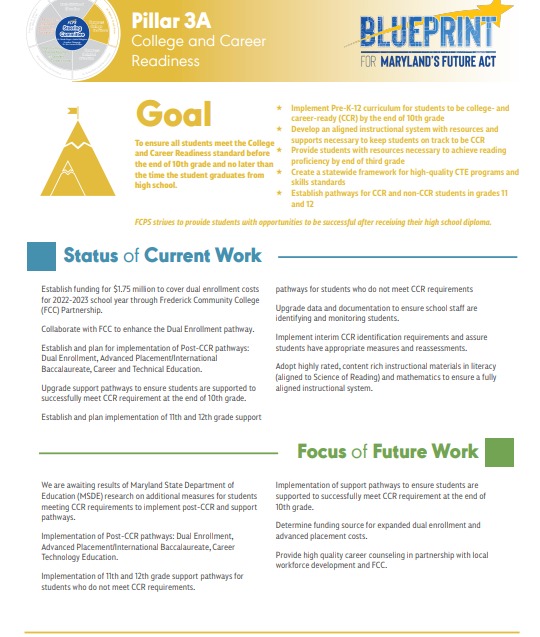The Blueprint for Maryland’s Future Act was passed in 2020 and amended in 2021 with the purpose of enhancing the quality of public education throughout the state of Maryland.
The Steering Committee is responsible for implementing the entire Blueprint throughout the county. There are five different pillars that the legislation is divided into, and each pillar also has their own committee that works on their set goals.
The major goals for Pillar 3A includes making sure students are “college and career ready” by the end of sophomore year, and then offering different career-specific pathways that students can take. At Oakdale High School, two of the “career specific” paths students can take following the development of their skills to be “College and Career Ready” could be Advanced Placement (AP) or Dual Enrollment at Frederick Community College (FCC).
Oakdale High Senior, Pragna Yalamanchili, registered for five AP courses this year. She explained her choice: “I choose to take these classes because I’m applying to several out of state schools and there’s a higher chance they will accept an AP credit over an FCC credit. I plan on double majoring in Environmental Policy and English so I will need the credits from most of these classes for my major. AP Psych and AP Art, I am mostly just taking because I find the subjects interesting.”
On the flip side, Tyler Koshar, another senior at Oakdale High School, registered for three FCC classes this year. He defended his choice to register for FCC over AP: “I wanted the college credits.”
Koshar’s stance is one that many juniors and seniors have. As upperclassmen try to decide which path is best for them, they’re often told it’s a matter of how well they are at taking a test. With AP classes, no college credit is guaranteed since certain colleges accept different test scores. However, with FCC, most colleges will accept all those credits, as long as a certain grade is achieved in the class as a whole.
In order to take AP tests, it would be a $100 fee. Participating in a Dual-Enrollment course would cost families at least $150. As students stack up more FCC classes or more AP tests, families would be spending hundreds of dollars on education before actually attending college. However, now with the Blueprint, the test and course fees are all waived, making them free for students.
The Blueprint for Maryland’s Future has made higher education options more accessible to all families throughout the state. As the committee continues their work to implement Pillar 3A throughout the county, the future looks promising for making many opportunities as accessible as possible to every student who wishes to take advantage of these endless possibilities.






























